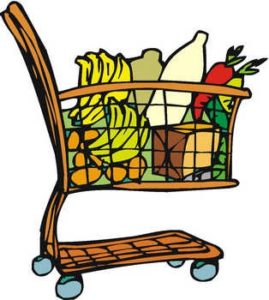Vegan Grocery Shopping During COVID-19

By Reed Mangels, PhD, RD
As an older person living in a state with ever-increasing cases of COVID-19, I try to limit my errand to those that are essential. I’ve chosen to continue to physically going to the grocery store but am doing my best to minimize both the number of trips I make and the time I spend in the store. I recognize that I am very fortunate to have enough space to store food and the money to buy several weeks’ worth of food at a time. Also, I’m only shopping for myself and my husband, not for a large family, which makes things easier. That said, I hope that some of these ideas that allow me to limit grocery shopping to once or twice a month will be helpful to others.
Spend more time planning in order to spend less time in the store.
Gone are the days when I planned the menu for that night or even for the next few days as I walked through the food store, zigging and zagging from the produce department to the pasta aisle and back to produce. Now, while I don’t extensively plan 2-3 weeks’ worth of meals, I have a sense that I will need 6 packages of tofu, 10 cans of assorted beans, some quinoa and rice, 5 cartons of soy milk, a couple of jars of peanut butter, and so forth. I think about recipes I might want to make and if there are any specialty ingredients I’ll need to get for them. I estimate how much fresh fruit and vegetables and bread we’ll need. I look at staples – are we running low on soy sauce or spices or flour? Are there some things I should buy a bit extra of in case plans change – like canned tomato products or pasta?
Make a list.
When I make my grocery list, I do it with the store’s lay-out in mind so that I don’t have to double back and pick up something I forgot. Like many stores, the one where I shop has one-way aisles, adding to the challenge of going back to pick an item I missed on the first pass. Because I never know which shelves will be bare, I try to think of alternatives before going to the store. If there’s no pasta, do we have enough rice or other grains that we can use instead, or do I need to pick up more of these in place of pasta?
Fruits and Vegetables
Unless you belong to a CSA or go to a farmer’s market, it can be challenging to buy enough fresh produce to last 2 or more weeks. Here’s the way that I approach it.
I think of produce in 2 categories:
- Products that should be used within a week or 10 days – including lettuce, stone fruit, most leafy greens, summer squash, herbs, peppers, bananas
- Sturdier produce that can last for 10 days to 3 weeks or longer – such as cabbage, carrots, winter squash, onions, cauliflower, melon, citrus fruit, apples, beets
For the first week post shopping trip we focus on food from the first category. We might have lettuce-based salads most days; later in the cycle salads will be coleslaw or carrot-raisin salad.
Produce lasts longer if stored properly. The Ecology Center has a helpful handout on produce storage. If I notice that vegetables are starting to look tired before we can eat them, I often make a pot of soup or another dish that can be frozen or refrigerated. If all the fruit ripens at once, some can be sliced and frozen to use later in crisps, smoothies, or on oatmeal. Having some frozen vegetables on hand, like frozen sliced peppers or frozen spinach, can add interest to meals when fresh produce is running low.
When I think about grocery shopping pre-COVID-19, I realize that many of our trips to the store were to pick up cartons of soy or almond milk or a loaf of bread. Now, I’m more likely to buy shelf-stable packages of plant milk for cooking and use the refrigerator space for the refrigerated cartons my husband likes for cereal. We freeze bread before the use-by date, so it doesn’t get moldy and bake our own if we want fresh bread. These ideas aren’t unique to the current situation. They’re ways I can minimize the time I spend on food shopping and minimize food waste.
